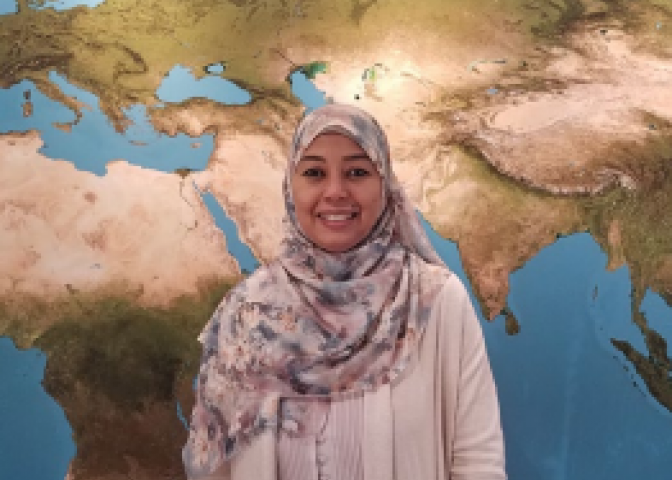Eiman Fadul
(Sudan)
MSc Hydrology, NUI Galway (1998)
Eiman Fadul from Sudan was supported by Irish Aid to study for an MSc in Hydrology at NUI Galway in 1998, one of 17 sponsored students on the programme from 14 different countries. We spoke with her about her time in Ireland and the opportunities that have opened up in the two decades since. Now, as she nears the end of PhD studies in the Netherlands, she also looks forward to returning to her home country to further share her research and practical experience.

I first graduated from the civil engineering department and was working as an assistant researcher. Later, I applied to the Irish Aid Fellowship with some of my colleagues and had a good chance through getting accepted, such a very good chance, which made a great change in my life. I had the privilege to be one of the graduates of the International Postgraduate Hydrology Programme at the National University of Ireland, Galway.
The programme was originally founded by Professor Eamonn Nash in 1979, who made major contributions to the science of hydrology, such as the introduction of Instantaneous Unit Hydrograph, Nash Cascade and the Nash-Sutcliffe Efficiency Measure. Pursuing a Master of Science in Engineering Hydrology increased my knowledge and academic skills, and provided a good networking opportunity. I got to know very valuable people, like Professor O’Connell. I really, really miss them. They did a lot for me and my colleagues – I can never forget them. I hope they are really doing fine now. Many of my colleagues back home were also very honoured to gain the knowledge and training associated with the Engineering Hydrology program at NUI Galway.
Being in Ireland was so nice, with all this beautiful country. Although the weather was so rainy it was still nice. What I remember most is we had only one classroom where we had all our classes and it was an environment where we were like a family, you met all the same people every day, we had the same times, the same breaks. We had a very nice group, so much coming together, and Professor O’Connell was like our father at that time! Also I remember the ICOS fellowship officer, Ms Ann, she was so good to us. I’ve tried to contact my old staff and colleagues – I’m really keen to see how they are now and to greet them and say thank you for everything they did for us at that time. I really appreciate that period of my life. Overall, it was such a good experience, it added valuable skills to my profession. We did a lot of good practices and discussions that helped us to face the challenges that emerged in practical problems when we went back to our countries.
When I went back to Sudan, having a Masters’ degree gave me a chance to get promoted. I went from being an assistant researcher to a research engineer and a lot of opportunities started opening up to me. I was taking the lead in research projects, I was heading a team to do work in the area of hydrology and sediment and all these areas that were related to our experience. I did some publications and research work related to water science and led projects working in different areas of the country funded by international organisations.
After several years building up further experience, a few years ago I had the opportunity to conduct a PhD study at UNESCO-IHE Delft Institute in the Netherlands and now I’m finalising it. I’m doing research that relates engineering hydrology to agronomy to risk management. It’s in an area that’s really lacking in research, called ‘spate irrigation’, which is a type of irrigation that is not really well known across the world but can be really important for poor people, poor farmers, poor communities to make a lot of changes in their lives and livelihoods. Everything is based on what I did in the beginning. It opened a lot of doors that required particular academic skills to gain higher positions with higher responsibility. So in a few months I’m expecting that I will be ready to go back home again and continue working at the Hydraulic Research Centre which takes the lead in water related research in the Sudan. I’m planning to make use of my research and to practice it in the field with the challenge of finding practical solutions that work under local conditions and limited resources. Now I have good training in terms of leadership, management and decision making. Knowing that leadership is a service provided to serve the community, I’m planning to transfer the knowledge I’ve gained to those who really need it so that I can make a valuable and tangible impact with what I’ve done. Working as a water professional affects and may even change the lives of people. That is a big responsibility.